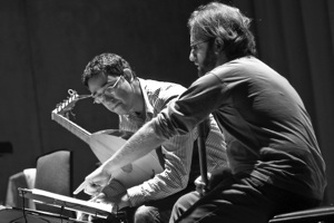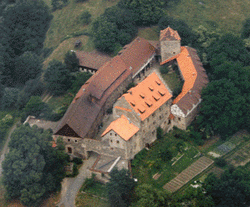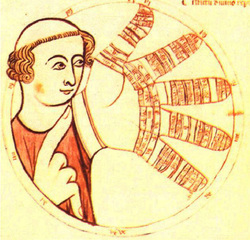
Some people are not only annoying know-it-alls, but have a regrettably evangelical streak to their personality. I can't help wanting to teach, and deep down believe I'm probably a better teacher than a player.
I've been giving instrumental lessons for years and years, be that privately, in master-class format, or through institutions such as the Petach-Tikva Municipal Conservatory where I was engaged for a period while still in Israel. At roughly the same time, I was asked to come back to my specialist high-school, and coach their early music ensembles. Since then, I've been lucky enough to coach both regular and ad-hoc ensembles as a project assistant in the Schola Cantorum Basiliensis during my studies there, and as part of the courses I give together with Marc Lewon in the Burg Fürsteneck Akademie für beruflische und musisch-kulturelle Weiterbildung.
The work with Marc deserves a bit more detail:
I've been giving instrumental lessons for years and years, be that privately, in master-class format, or through institutions such as the Petach-Tikva Municipal Conservatory where I was engaged for a period while still in Israel. At roughly the same time, I was asked to come back to my specialist high-school, and coach their early music ensembles. Since then, I've been lucky enough to coach both regular and ad-hoc ensembles as a project assistant in the Schola Cantorum Basiliensis during my studies there, and as part of the courses I give together with Marc Lewon in the Burg Fürsteneck Akademie für beruflische und musisch-kulturelle Weiterbildung.
The work with Marc deserves a bit more detail:

The two of us were allowed free range in designing and executing a series of 12 intensive courses on Medieval music in the wonderfully supportive atmosphere of their own Medieval castle (see right). Over two years, a hardcore group of 18 full practitioners and a further 10 partial followers met every couple of months and endured our instruction in the performance, history, theory, notation, musicianship skills, manuscripts, and literature relevant to the main musical developments from Ancient Greece to about the year 1500 with a subtle blend of saintly patience and eager enthusiasm. Each meeting lasted three days, the first and last of which were dedicated to practical musical work (masterclasses, ensemble coaching, various historic improvisation and ear training techniques, sight reading from original notation), while the middle day - typically lasting from 9 a.m. to 11 p.m. and to which the part-time participants joined in - was dedicated to more frontal lecturing on the theoretical aspects listed above. So much fun was had by all, that already in the third and fourth units, students started murmuring that it would be really nice to extend the course by a third year, which we duly did, covering in more detail (and following vote in the class) topics we only skim over in the main course. Our 18th meeting was dedicated to the preparation and performance of a concert of some of the music we looked at throughout the course, which was recorded by and transmitted on national German radio. On top of these, the castle requested other one-off three-day jollies on Medieval themes open to participants not subscribed to our main course. We are currently attempting to bring enough people together to start a second round of our course, and as both Marc and my knees have started going grey round the edges, we asked Baptiste Romain to share the teaching load with us.

All this brings me to the teaching of other musical skills I had the pleasure to undertake. These included improvisation lessons (following the Vatican Organum treatise) while still at the Schola
